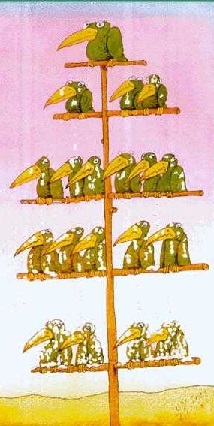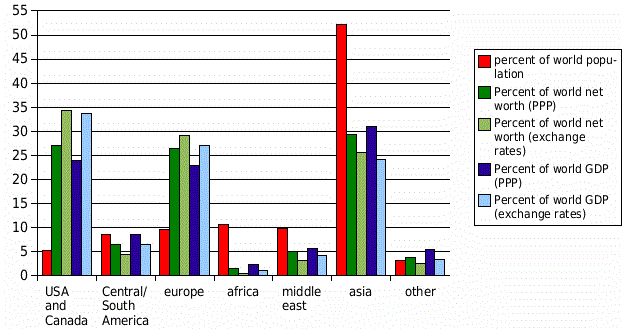
By Trond Øverland
The vast majority of alternative economic thinkers seem to think there is something seriously wrong with the way wealth is distributed today. They say prosperity should not be reserved for a few, it should be the property of many – the world’s riches should be more evenly distributed. PROUT does not agree with these “wealth distributors”:
“PROUT suggests that increases in per capita income are not a sufficiently reliable and scientific index to determine the standard and progress of a particular socio-economic unit. Rather, this approach is misleading and deceitful, because it refers to a simple mathematical calculation of total national income divided by total population. This does not give the correct picture of the standard of living of the people of a particular socio-economic unit, as the wealth disparity in society is concealed.
“Purchasing capacity is the real index of how a person’s economic needs can be met by their income. All PROUT’s plans and programmes in the socio-economic sphere should be aimed at increasing the purchasing capacity of the people. Note that PROUT stresses increasing purchasing capacity and not per capita income.”[1]
Wealth distribution
In particular, wealth distribution is the darling of statisticians and materialist socialists:
Statistics – The chart further below shows that wealth is unevenly distributed throughout the world. For instance:
- Africa holds just above 10 per cent of the world’s population and holds hardly any wealth.
- Asia is the home of more than half of us but holds just a bit more wealth than the US and Europe.
- The US is home to five per cent of the world’s population and holds up to one third of the world’s wealth.
The uselessness of such figures and the thinking behind them is indicated in the quote above.
Socialism – Conventional socialists intend to distribute wealth equally. They state that by distributing wealth more evenly social justice will increase. The two main problems with their concept seem to be:
- – Wherever egalitarian distribution has been attempted, it has resulted in extreme concentration of wealth in the hands of the representatives of the public: State capitalism and state dictatorship were and are still rampant under communism, leading to the same level of brutality and injustice, if not more, than under capitalism.
– The social democracies of western European depend on capitalism to sustain their social welfare programs. Consequently their dream of providing at least some measure of welfare even for their poor is cracking at the seams now that capitalism faces collapse. - Socialist distribution tends toward increasing stagnancy as people get used to having their basic needs met without having to make a real effort to earn their way. In a system where everybody receive according to need and are required to “produce according to capacity”, the number of people who care to contribute to the collective diminishes. Consequently the number of people who develop themselves significantly decreases in such a system.
Wealth concentration

The essential problems with the ownership of “the one per cent” are:
- Resources are kept away from the people who could really use them for:
– Survival
– Development
– Realizing fresh potentialities - The income gap, generated by the increasing number of unemployed and relatively and absolutely poor who cannot fend properly for themselves and serve their debts, becomes an albatross around capitalism’s neck.
- In times of uncertainty the super-rich withdraw their vast resources, leading to recessions and depressions with severe consequences for the middle classes and the poor.
- Monopolies breed monoculture, particularly in agriculture and throughout markets in general.
Wealth concentration is a grave problem. Nonetheless, its solution require us to think of something more practical than the utopia of uniform distribution of wealth:
- Firstly, thinking in terms of economic equality would be as wishful as believing that God’s invisible hand will regulate capitalism’s markets for the good of all.
- Secondly, materialist socialism has already proved that the idea of equal distribution is a great economic evil as indicated above.
- Thirdly, social, mental, and other more subtle existential challenges are not resolved in materialist and self-centered systems such as the modern welfare states of Europe; rather such problems are rampant there.
Year on year
- 2030: The richest 1% will control two-thirds of World’s wealth.
– House of Commons (UK) library figures - 2019: The world’s 26 richest people own the same wealth as the poorest half of humanity. – Oxfam
- 2018: The super-rich accumulated 82% of the wealth created the year before – the poorest half of world got nothing. – Oxfam
- 2017: World’s 8 richest men are as wealthy as half the world’s population
- 2016: World’s richest 62 people as wealthy as half of the world population. – Oxfam
- 2015: 1% of the world’s population will own more wealth than the other 99% by next year. – Oxfam
In Russia 25 years after the collapse of Communism:
- 1% of the Russian population controlled 71% of all wealth
- 110 persons controlled 35% of all wealth
- More than 9 out of 10 Russians owned less than the equivalent of $10.000
(source: Credit Suisse 2013)
Unlimited wealth
PROUT recognizes the need to limit individual wealth accumulation but for a different reason than the “wealth distributors” do. As the world’s physical wealth is limited, one person’s accumulation will surely result in scarcity for others. Hence PROUT’s first fundamental principle states the need for the limitation of wealth accumulation.
What we require in order to devise a rational approach to wealth distribution is a system that recognizes the limitations of the physical world as well as the boundlessness of other more subtle potentialities. PROUT’s aims at such a system by first of all decentralizing the physical economy:
- The initial step would be to recognize the right of local people to control their economic life in order to ensure maximum utilization of existing resources and skills as well as the development of more dormant potentialities.
- A second step would be to organize the large majority of production, distribution, sales, trade, etc. through cooperatives. For this to happen, the idea of capitalism and materialist socialism must be abolished.
Capitalists and socialists
Capitalists will find no scope for capitalism in PROUT. They will therefore have to decide between joining in this radically different, progressive-minded socio-economic setup or forget about capital management and take up some other vocation instead. Those who choose the former route will find that their particular capitalist skills will be recognized and utilized for the good of all but that their ability to accumulate private wealth will be strictly limited.
Socialists on the other hand would have to embrace the importance of the individual to the community: The value of society lies in the individual and vice versa; the state exists for the individual. In our time and age no society can sacrifice individual worth at the altar of the collective body without having its own existential value questioned.
In economic life, handouts would only be available to the severely handicapped and aged. Employment would be the way to establishing oneself in society in a dignified way. PROUT’s economic system is not profit-motivated but geared towards basic consumption for all. Beyond that, its goal is for all to realize their potentialities to the fullest. To live off others in perpetual unemployment will simply not be an option in PROUT’s progressive system.
Progress
Real progress denotes movement towards an increasingly subtle state of being. Hence the spiritual nature of human beings is the yardstick of any type of Proutistic development – political, socio-economic, cultural and so on.
While physical wealth is limited, mental and spiritual wealth are in abundant supply. The socio-economic system of PROUT promotes the utilization of all this precious wealth, both for securing a fair and progressive utilization of physical wealth as well as for individuals’ and the collective’s realization of life’s higher potentialities.
PROUT’s way of distributing wealth is intimately tied up with the need to accelerate socio-economic dynamics rather than slowing them down. In the process, PROUT seeks to adjust the utilization of physical, mental and spiritual potentialities with each other.
While the immediate goal of PROUT’s progressive socialism is to secure basic necessities for all – food, shelter, clothing, medical care and education – PROUT beckons humanity to keep proceeding towards the realization of subtler and still more subtle and powerful resources.
PROUT recognizes that all human beings harbor great potentialities for mental and spiritual development. The proper adjustment of the physical, mental and spiritual utilizations of individual and collective potentialities is what makes PROUT the Progressive Utilization Theory.
Sources
1 From “Questions and Answers – 2”, P.R. Sarkar, PROUT in a Nutshell Part 12, Ananda Marga Publications.
2 Financial world dominated by a few deep pockets”, By Rachel Ehrenberg, Science News, Sept 24, 2011. www.sciencenews.org/view/generic/id/333389/title/Financial_world_dominated_by_a_few_deep_pockets
3 http://en.wikipedia.org/wiki/Distribution_of_wealth“
Copyright The author 2012
